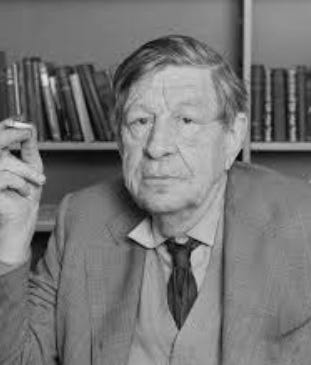I appreciate that the last post was a little challenging, either conceptually or emotionally (or both), for some readers, so I thought we’d go with something a little lighter and more fun this post. As a little context: inspired by the breath-taking blink-of-an-eye conversion, by so many people, that we’ve all witnessed in recent weeks, from utter slavish devotion to the official COVID mandates narrative to the equally slavish utter devotion to the official Ukraine narrative, I cheekily adopted a line from the below for my name on Twitter (you should all be following me on Twitter: @evolvedpsyche – unless of course you take Twitter seriously).
But I thought that, really, this poem which hasn’t received the widespread appreciation that it deserves, should be amplified with my modest little platform. And, as you read it, bear in mind: according to my analysis (in my must-read book, The Managerial Class on Trial), by the poem’s publication in 1940 the managerial class had only consolidated its private sector power for about half a century, and it’s increasing consolidation of public sector power wasn’t much more than a couple decades old. So, this poem reveals remarkable prescience from Auden.
If you already know it, I expect as a reader of this substack, you’ll appreciate the opportunity to revisit it. And if you don’t already know it, you’re in for a treat from one of the great poets of the English language.
The Unknown Citizen
(To JS/07 M 378
This Marble Monument
Is Erected by the State)
He was found by the Bureau of Statistics to be
One against whom there was no official complaint,
And all the reports on his conduct agree
That, in the modern sense of an old-fashioned word, he was a saint,
For in everything he did he served the Greater Community.
Except for the War till the day he retired
He worked in a factory and never got fired,
But satisfied his employers, Fudge Motors Inc.
Yet he wasn't a scab or odd in his views,
For his Union reports that he paid his dues,
(Our report on his Union shows it was sound)
And our Social Psychology workers found
That he was popular with his mates and liked a drink.
The Press are convinced that he bought a paper every day
And that his reactions to advertisements were normal in every way.
Policies taken out in his name prove that he was fully insured,
And his Health-card shows he was once in hospital but left it cured.
Both Producers Research and High-Grade Living declare
He was fully sensible to the advantages of the Instalment Plan
And had everything necessary to the Modern Man,
A phonograph, a radio, a car and a frigidaire.
Our researchers into Public Opinion are content
That he held the proper opinions for the time of year;
When there was peace, he was for peace: when there was war, he went.
He was married and added five children to the population,
Which our Eugenist says was the right number for a parent of his generation.
And our teachers report that he never interfered with their education.
Was he free? Was he happy? The question is absurd:
Had anything been wrong, we should certainly have heard.


That is great, indeed.